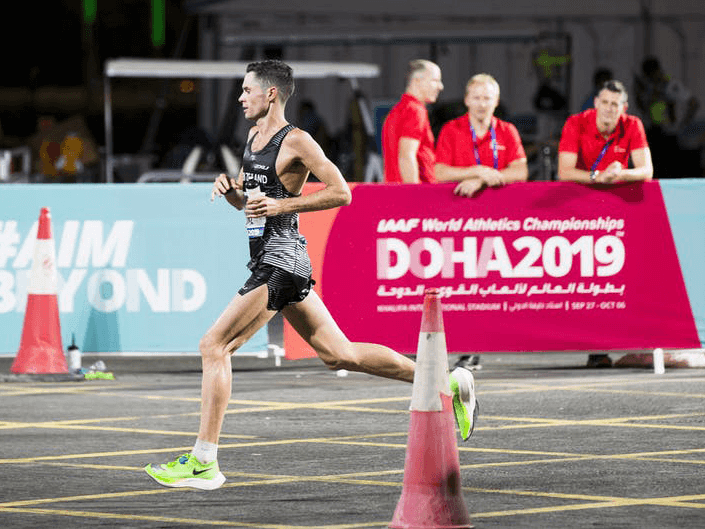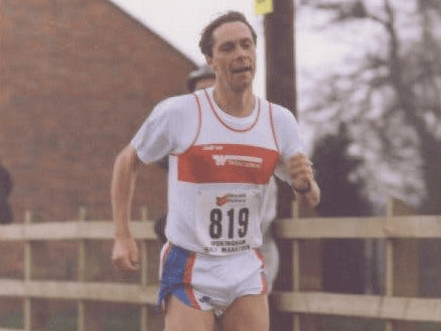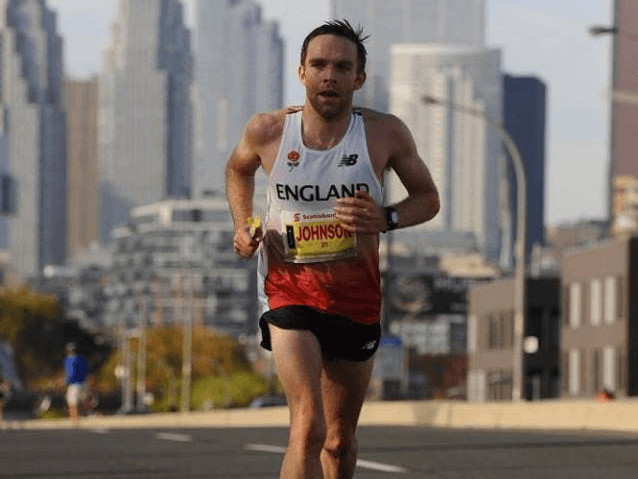TRAINING INSIGHT: Q&A WITH MALCOLM HICKS: 2:10 NEW ZEALAND INTERNATIONAL MARATHONER
Stats:
Marathon PB: 2:10:05 Seville Feb 2020
Half marathon PB: 1:04:29 Dronten Netherlands, 2017
10K PB: 28:58 Melbourne Australia, 2015
5K PB: 13:37 Heusden Belgium, 2017
Intro
I’ve been lucky enough to work with Malcolm for the past couple of years since his move from the Netherlands to the UK. He is an athlete who is very much in tune with his body and has a great sense of knowing what he needs to keep healthy and running well.
Malcolm is a New Zealand international marathoner who recently ran a phenomenal 2:10 Olympic qualifying time at Seville Marathon in February this year, in what was only his fourth full marathon.
Malcolm has been kind enough to provide an insight into his athletics journey to the marathon and what strategies help him keep him performing at his best.
How did you get involved in athletics?
I have been involved in athletics from a young age, going to kids club athletics with my brothers, and then remained in the sport through local athletic clubs through school and university. Wesley Athletics and Harrier club is still my home club back in Auckland.
Did you do any track?
I have spent the majority of my running career as a track runner, primarily 1500m and 5000m. I really do love racing on the track, it is exciting and high energy in a way that often can’t be replicated on the roads. My personal best for 1500m is 3:42.8, and 5000m is 13:37. Although like many athletes, the older I got, the better suited to the longer distances and higher mileage training I became. I think it is the natural progression of most track runners. Although 10 years ago I never would have thought I’d end up being a marathoner! Let alone have the most success at the marathon distance.
How did you progress/get into marathon running?
After moving to the Netherlands (NL) in 2016 I decided to start racing on the roads (5km to half mara), as the road racing scene in NL is fantastic. It was a nice change after being a track runner for so long. My mileage was around 90-100 miles at this stage, so once I decided it was time to try the marathon distance in 2018 (including a move to the UK), I was already relatively comfortable with the mileage required, and only made small increases to my weekly volume.
Living near Paul Martelletti in East London was a huge benefit, especially for my first marathon. Getting to train and learn from a seasoned marathoner such as Paul was fantastic, as there is so much to learn (and continue to learn) with the marathon. Being able to gauge my fitness off of Paul and keep up with him in workouts gave the confidence I needed heading into my debut marathon in Berlin in 2018.
What would a typical training week in a build up to a marathon look like?
Each marathon build-up I have progressed my mileage fractionally. It is less of a conscious effort to run more, but a natural progression as my workouts have improved in quality and the added compounding strength gained from each marathon cycle has meant I can handle slightly higher volume workouts and long runs.
For my most recent marathon build-up (2:10:05 in Seville, Feb 2020) I was running between 180-195km per week. My marathon build-ups are usually around 12 weeks long, including a taper, and progress from building a strong base of long steady running, into marathon paced workouts later in the cycle. Obviously this does depend on the level of fitness you have starting a marathon specific block.
If I am starting a marathon block fit and healthy, the first 5-6 weeks are focused on building to peak mileage and peak long run distance (~40km). With the addition of short hills to keep the mechanics strong. The latter 6-7 weeks are more focused towards adding quality into long runs (workouts, steady finish, marathon pace to close etc) and marathon specific pace workouts. Before Seville I left marathon specific workouts quite late in the cycle, but when you start the marathon pace work off such a strong block of steady mileage, the fitness and speed comes quickly.
Typical week includes:
Monday: easy 60 min am 30-40 min pm
Tuesday: easy 60 min am, 30-40 min pm
Wednesday: Marathon specific workout in the morning, usually 30-35km in total, of which 20-25km consists of mixed paced workout with a warm-up and cool down either side. 30 min easy jog plus gym S&C in the afternoon
Thursday: easy 60 min am, 30 min pm
Friday: morning, 90-105 min including a low volume set of speed (e.g.: 6 x 1km), afternoon gym S&C.
Saturday: easy 80-90 minutes
Sunday: Long run of 35-40km, including some specific work (e.g.: last 10km at marathon pace).
What sort of races do you like to include in a marathon build up and how far out from race day?
I generally try and include one or two races of 10km to half marathon in the build-up.
Sometimes my build-ups have been time pressured (e.g. only 10 weeks long) hence, the time required to do a race, reduce volume to freshen up, then recover afterwards isn’t always available to me.
I usually don’t run these races 100% effort, but try to make them a very solid effort, without needing the additional time to recover afterwards, and keeping the volume high heading into and out of the race.
Usually I would try to run a race in the 3-4 weeks before a marathon, as a check on fitness, but also for a mental break of the long and monotonous cycle that is a marathon build-up!
Sometimes the available races aren’t available at the time you would like to include them, but this isn’t a problem (before my marathon in Seville I didn’t do any races during the buildup). A hard time trial effort can have the same effect, and you have the ability to set it up exactly as you would like to, including start time, drinks, location etc.
How much rest and sleep to you get when you are in a marathon build up?
Working full-time and trying to train ‘full-time’ makes getting enough sleep difficult. But it is one of the most important aspects of recovery. I usually try to get a minimum of 8 hours, and then try and catch up more in the weekend with some naps. 9 hours is ideal, although rarely a reality!
Do you follow a specific diet when training?
I have never followed a specific diet, or counted calories etc. I generally follow the rule that you need to fuel the fire while training hard, while ensuring you get all the nutrients you need from a balanced diet.
Although I am not one to crave rubbish food, mainly as I know the next morning while training I will feel just as rubbish!
I generally try to focus on good fats and keep everything I eat as unprocessed as possible, and always cook from scratch. Personally I minimise how much meat I eat but keep the quality high (keep it lean), and plenty of fresh fruit and veggies. Whole grain pasta and rice is also brilliant as it fills you up faster, without the need for bowl after bowl of white rice to finally feel full!
Do you complete regular strength and conditioning exercises (including mobility/technique drills and stretching)?
S&C is something I have added into my schedule as a priority the last year or two. I have always undertaken some sort of S&C but on a sporadic basis.
I use it primarily to work on weaknesses, imbalances and ensure I stay injury free. I do a fairly basic strength routine, some body weight exercises, core work, resistance bands, and some weighted lunges and squats. Nothing particularly impressive but it covers the bases well.
Mobility is also increasingly important the older I get!
Each morning I have a routine of simple yoga stretches, some mobility exercises and rolling around on the roller or massage ball.
I do this each morning while having coffee and toast on the yoga matt, and catching up on emails or social media.
At 25 years old I didn’t need to do any of this, but now at 32 it is an essential part of my morning pre-run routine!
What role does physio / massage /osteo play in your training?
I rely on my Physio (Scott Newton) and Osteo for regular treatment to keep my moving and training at a high level.
I prefer to ensure I am healthy and have good range of motion by regular treatment, rather than rushing to the physio when hurt.
Many athletes think they don’t need treatment while they are running well and healthy. But this can be a false sense of security, and the good times usually don’t go on forever. I’ve been through enough injuries to know that it is always better to have a prehab mindset, rather than end up in rehab.
Regular treatment ensures your range of motion is maintained, and your regular issues (or previous injuries) are looked after to ensure they improve, or at least don’t deteriorate.
Running (and especially marathon running) is all about consistency. Part of maintaining that consistency is ensuring you stay healthy, which is where a good relationship with your physio is so important, as they get to know your body very well, and how to keep it healthy and moving.
Do you rotate your footwear for different sessions throughout the week?
I generally try to rotate my footwear regularly. It stops your feet getting too use to one specific shoe.
I like to train in at least two different models of running shoe for the bulk of my weekly mileage, and then have a different shoe which I wear for faster workouts. Feet (mine especially!) can get jammed up and lose all of their mobility. There are so many bones and joints in your foot and you need to keep them from becoming stuck or losing their flexibility. There are also lots of easy techniques to keep your own feet mobile and healthy.
Do you have any mental preparation strategies/routines when you are racing?
When it comes to racing I try and be as clinical as possible. Once you get to race day, all the hard work is over and you get to enjoy the racing.
You should have a plan, and the simple goal is to execute that plan on race day. If you have prepared well, then you have thought about the plan and trained specifically for it. Therefore race day only requires a straightforward and clinical approach.
I try to think back with confidence to all the training that I have put in, and the positive signs from workouts which I use as indicators for potential race performances.
Harnessing the emotions and nerves that come with racing can be good, as with it comes adrenaline. Although be careful the nerves don’t take over, which can be draining on your energy.
How have you adapted your training and goals with the current COVID-19 restrictions in place?
The current COVID crisis has really turned everyone’s racing plans on their heads.
Without knowing when we will be able to compete again (several months away at least) I have taken training down a level of intensity, and am focusing on building a robust and strong foundation, to help me stay healthy and training consistently. This time is all about laying the base for the race specific training I will be doing later in the year.
I am currently in a phase of strength building, plenty of long runs, and speed mechanics like short hill sprints. It is not often we as athletes are given such a period to train without the pressure of upcoming races. So if you need the mental break from training, take it now, as time is on your side. If, however, you prefer to stay focused, take the time to work on any weaknesses or imbalances, or get really strong with core work and strength exercises. Including all those physio exercises people have probably been avoiding!!
I managed to get my hands on a treadmill, which apart from taking up most of my living room, allows me to get a second jog in the evening indoors, and avoiding busy times in the park where there are often too many people out and about for my liking.
Regarding goals, my only real goal with a set date is the 2021 Olympics, which is a long way off! So at the moment I am working towards the already postponed World Half Marathon champs in Poland in October (…if they go ahead) and potentially a marathon in December or early 2021. These plans are loose and I am prepared to be flexible as to when we come out the other side of this crisis.
The main focus during this period is to stay healthy, enjoy the running, and make sure I’m ready to race later in the year when we get the opportunity.
I hope that you found Malcolm’s training insight interesting.
If you’re having any niggles or if you’re interested in improving your performance and would like to be connected with a UKA qualified coach, then get in touch with me at [email protected]
Happy running and keep safe.
Cheers
Scott



